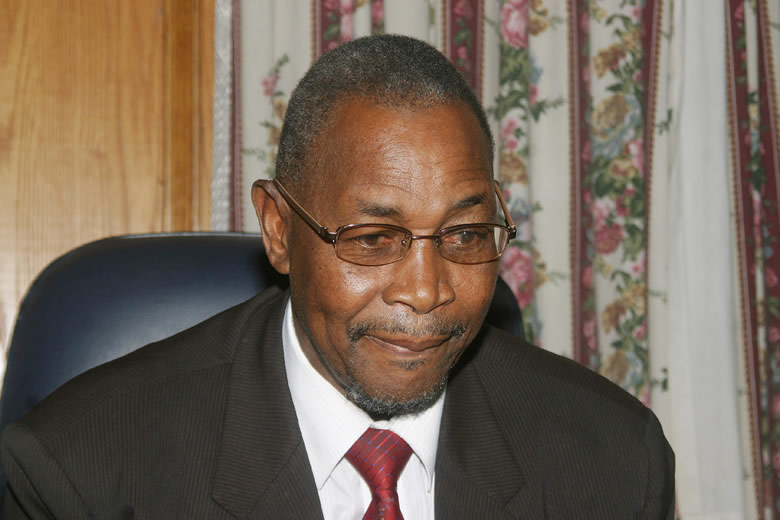Tendai Mugabe Harare Bureau
President Mugabe has called for an emergency Politburo meeting this week to deal with reports of vote buying and intimidation among other irregularities that characterised the party’s women and youth league conferences held last month.
The President also took a swipe at the party’s Harare provincial leadership for causing divisions and making clandestine manoeuvres to push the First Lady Amai Mugabe out of the province and seek a “political home” in Mashonaland West.
President Mugabe said this while addressing thousands of Zanu-PF supporters who braved the chilly morning weather at the Harare International Airport yesterday to welcome him from his week-long State visit to China.
“Recently, we were saying the youths were ill-treated,” said the President amid wild cheers from the crowd.
“We are saying, yes, we cannot discuss the matter here with Cde Mutasa but we have a meeting this week to discuss how things are going on. How did things go at the two conferences for youths and women? Is the path we are moving the same or we have gone separate ways?”
The President’s remarks followed the disorderly manner in which the youths and women’s conferences were organised and the unbecoming behaviour that was being exuded by party members, especially in Harare Province.
Zanu-PF Harare provincial youth chairman Cde Godwin Gomwe last week had indicated that the youths would brief the President on political developments that transpired in the party while he was in China.
However, President Mugabe said the Harare International Airport was not the ideal platform to deal with party matters.
The President chided some senior officials who were abusing the name of the party for their selfish and personal gains ahead of the December congress.
He said he was duty bound to address all issues affecting the party including challenges in the Youth League and other organs.
“I was not chosen by one person, I was chosen by the party. I am not a President concerned only with the main wing of the party leaving youths and women.
“I don’t want people who use the party for their own ends. You were elected by the people, but you now want to elevate yourselves without their support, we don’t want that.
“We say down with you. We shall discuss this matter,” he said.
Things reached boiling point in Zanu-PF a fortnight ago after Harare Youth League deputy chair Cde Edison Takataka, was reportedly beaten up in the presence of Politburo member Cde Tendai Savanhu in Mbare.
This prompted another Politburo member Cde Cleveria Chizema, to call for the dissolution of the Cde Amos Midzi led executive in Harare on allegations of fomenting divisions in the province.
Cde Chizema accused Cde Midzi and Cde Savanhu of using money to divide the party in Harare.
However, President Mugabe said Harare was the country’s capital city and no one should claim its ownership.
“We want the party to be strong and Harare, Harare, Harare is notorious for disunity,” he said.
“Harare, Harare, Harare is our capital. It’s the nation’s capital, that’s where the party’s headquarters are.
“So Harare is obliged to regain the constituencies we lost to the MDC. We must be proud of our capital which is the mainstay of the party. Now there is confusion and divisions, with some saying Harare is ours, you are not from Harare, move out, aaah.
“We don’t want Harare like that. We are all united in Harare. It does not belong to one person. I am saying so because I heard someone sent my nephew (Cde Patrick Zhuwawo) to go and tell Amai Mugabe to leave Harare. Where will she go?”
The President said he would get to the bottom of that matter and check where those powers were coming from. “I said I wanted to hear why she is being removed? And where will she go? But I also want to hear where this person who calls himself emperor of Harare gets his powers. We don’t want that kind of behaviour.
“Even myself, I will never say Harare is mine. It will never happen. So let us all have a sense of belonging. We all belong to each other and there has to be that understanding.
“We are one person in Zanu-PF. It does not matter you are in Harare, Bulawayo, kwaMutare or kuGweru you should feel free. Each part of the country is your part. Zimbabwe is ours together. This is the leadership we must demonstrate.”
President Mugabe said party members should feel free to express their grievances but that should be done using formal party channels.
“We heard kunze uko kuti people were being refused to speak out. No.
“We speak out but the way we speak out must be the way we have in the party. We have our channels in the party, we report what we have as grievances through the channels we have in the party, but I will assure you that we will listen to your grievances all of you.”
President Mugabe briefed the gathering which was in high mood that his visit to China was a success.
Among other things, the President said, the visit sought to cement the historical relationship between the two countries. “Once again I want to inform you that our visit to China was a very productive visit indeed,” he said.
“We went to China firstly, to cement the relationship that we built during our liberation struggle and on that basis to seek cooperation from the people of China, their support as we move ahead especially with our new socio economic programme, which we call Zim-Asset.
“To seek assistance from them, assistance financial, assistance political and diplomatic.
“President Xi Jinping said China will continue to stand by us and continue to be as friendly to us as it was before — that the support we have asked for in various areas — area by area China will provide to the best of its ability — that China is grateful to Zimbabwe for what Zimbabwe has done to turn those countries which had their back to China so they could be friends of China and for the support we continue to give them internationally.
“Support we give them for One China Policy and they said in as much as we expect them to support us internationally, they also expect us to support them internationally. That is the reciprocal bond that is between them and ourselves.”
President Mugabe said Beijing condemned the illegal sanctions imposed on Zimbabwe by some Western countries.
He described the sanctions as “meaningless”, adding that China was seeking equal friendship with Africa. “They condemned the sanctions, meaningless, illegal sanctions that have been imposed by the Europeans and Americans and say this is not the policy of China.
When China comes to Africa, it does not intend to impose itself, nor does it countenance the sanctions that are imposed by countries outside Africa.
“It supports the freedom and national sovereignty of each and every country in Africa and I do hope that those outside Africa who have made hegemony and neo imperialism their policies will learn a bit from Chinese policy.”
He said Zimbabwe would always remember the revolutionary contribution China made by way of supporting the guerilla movement materially during the liberation struggle.
The President thanked Zanu-PF supporters for their unwavering stance against factionalism and tribalism.
President Mugabe was welcomed by Vice-President Joice Mujuru, Senior Minister in the Office of the President and Cabinet Cde Simon Khaya Moyo, Presidential Affairs Minister Cde Didymus Mutasa, senior government officials and party members.










